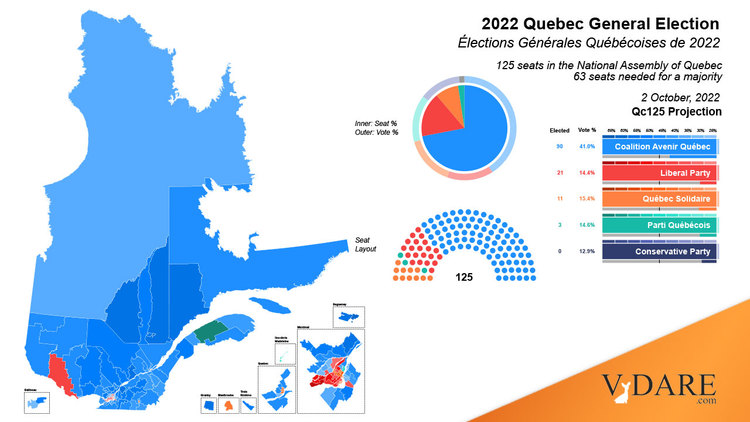
10/04/2022
Earlier by Rémi Tremblay: Quebec National Conservative Legault Set For Re-Election — Too Bad He’s Only An Opportunistic Immigration Patriot
As anticipated, François Legault won Quebec’s elections with an overwhelming majority. Less than 10 minutes after the voting polls had closed, the very official Radio-Canada (the French division of the Canadian Broadcasting Corporation) announced not only that the Coalition Avenir Québec (CAQ) would form the next government, but also that François Legault would count on a majority of Members of the Provincial Parliament in Quebec’s National Assembly [Quebec’s CAQ secures bigger mandate with pledge to cap immigration, protect French, by Allison Lampert and Ismail Shakil, Reuters, October 4, 2022].
While no one was paying attention, the national populist party "Coalition Avenir Québec" won a super majority in Quebec’s assembly elections
— Ryan James Girdusky (@RyanGirdusky) October 4, 2022
Although the results were still partial, one fact was striking: In several ridings, the CAQ scored more than 60%, something extremely rare especially in a context where five parties were trying to be elected. The analysts then went on to analyze who came second in the different ridings, even though it has no actual importance.
As mentioned before this week, the CAQ’s reelection is not necessarily good news for the nationalists. True, François Legault does not seek to increase immigration, but that will not slow down the dispossession of Quebecers and the threat to the French language. The only good news in store is the very recent idea voiced by Legault when he realized that the Parti Québécois was increasing in the polls: organizing a referendum on the immigration question.
However, though the media were quick to demonize the idea and present it as an anti-immigration move, that is not exactly what it is: Legault’s planned referendum is solely on the question of who should manage the flow of immigrants in Quebec. Should Quebec have total control on who settles here, or should it be a shared responsibility between Quebec and Ottawa as it is right now? Right now, Quebec can choose some categories of immigrants and the overall numbers, but Ottawa decides for the immigrants who fall in the family reunification program and for the so-called asylum seekers.
Thus, the question that Legault plans to ask is not if we want to reverse the trend, but who should be in charge of the Great Replacement in Quebec.
Interestingly, the result map, via Wikipedia, shows that the CAQ managed to sweep the whole province of Quebec, except the urban ridings of Montreal, Quebec and Sherbrooke.

In Quebec and Sherbrooke, dense neighborhoods where many students live voted Québec Solidaire, a far left party that managed to get 11 ridings of 125, with 14% of the vote. The Parti Québécois came in second place with 15%, but held one seat in Eastern Quebec, while the Conservative Party, with 13%, didn’t win any MPP.
The Liberal Party, neck and neck with the Conservatives, managed to win the role of official opposition, thanks to the concentration of their votes. In Montreal, the battle was hard fought between the Liberal Party and Québec Solidaire, and both tried to appeal to linguistic, religious and ethnic minorities. It is this concentration of votes within the very multicultural metropolis that explains how the Liberals secured about 19 seats. Their leader, Dominique Anglade, tried to de-ghettoize her party, but with her frequent talks on systemic racism and other conspiracies, she managed to win no seats outside the ridings where French Canadians are a minority.
In Parliament we will thus see François Legault as the champion of the French Canadian majority, opposing Dominique Anglade, the representative of the ever increasing minorities. Too bad Legault is not ready to point that out.
This is a content archive of VDARE.com, which Letitia James forced off of the Internet using lawfare.